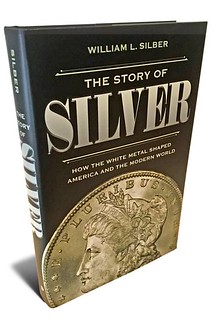
PREV ARTICLE
NEXT ARTICLE
FULL ISSUE
PREV FULL ISSUE
NEW BOOK: THE STORY OF SILVERA new book on the history of silver was reviewed in the Wall Street Journal February 20, 2019. Here's an excerpt. -Editor
Biography is the word, as William Silber's colorful narrative is one of personalities as much as it is of ideas and events. Like gold, silver can preoccupy its fans to the point of obsession, as it did the Hunt brothers, Texas inflation-phobes who lost a fortune in 1980 by betting on silver and therefore against Paul Volcker, then chairman of the Federal Reserve, and Mr. Volcker's sky-high interest rates. In 1873, Sen. John Sherman, an Ohio Republican, sponsored legislation to strike silver from America's monetary rolls, relegating it to small change and silver dollars. So dry was the author's legislative draftsmanship that nobody seems to have penetrated it. Unmistakable, however, was the subsequent plunge in the silver price and the resulting howls of the impoverished miners. The "Crime of '73," they called Sherman's Coinage Act, though the crime was arguably the failure of his congressional colleagues to read the bill. Mr. Silber blames Sherman for "a great deflation in the United States during the last quarter of the nineteenth century." Or perhaps he should blame human progress. The 1885 Report of the Commissioner of Labor relates that, in a certain factory six years earlier, 17 skilled men had produced 500-dozen brooms a week. By 1885, in the same, now-mechanized factory, nine men turned out 1,200-dozen brooms a week. Presumably broom prices declined because it cost less to make them, not because there was too little silver in the customers' pockets. The voters seem to have agreed that life was getting better, not worse. At least, William Jennings Bryan, a Democrat running for president in 1896 on a pro-silver, pro-inflation platform, lost to William McKinley, the Republican gold-standard champion. Mr. Silber's 20th-century cast of characters features Henry Morgenthau, secretary of the Treasury under Franklin D. Roosevelt, who carried out presidential orders to raise the price of silver and thereby placate the Western silver bloc... He's on firmer ground in describing the great silver-coin famine of the 1960s. No mystery here; the coins disappeared into vaults when the silver value of a dime topped the stated 10 cents, or of a quarter, the stated 25 cents. (For a less fervid account of this episode, see William F. Rickenbacker's 1966 book, "Wooden Nickels.") The best and longest section of "The Story of Silver" concerns the Hunt brothers' blameless purchase of 200 million ounces of silver to protect against the depreciating paper dollar (as they maintained) or their criminal conspiracy to corner the world silver market (the government's contention). Either way, Nelson Bunker Hunt, leader of the family triumvirate, rode the silver price from a few dollars an ounce to $50 an ounce and most of the way back down again. Losses reached the billions. I can't help but be impressed by a reviewer aware of such an obscure book as Wooden Nickels, one I've had on my library shelf for many years. -Editor To read the complete article (subscription required), see: Wayne Homren, Editor The Numismatic Bibliomania Society is a non-profit organization promoting numismatic literature. See our web site at coinbooks.org. To submit items for publication in The E-Sylum, write to the Editor at this address: whomren@gmail.com To subscribe go to: https://my.binhost.com/lists/listinfo/esylum All Rights Reserved. NBS Home Page Contact the NBS webmaster 
|

